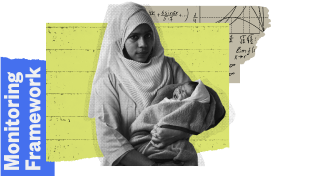Select one of the commitments to see its regional progress reflected on the map
Click on the purple indicators
on the map to discover select country profiles
Implementation and funding
Family Planning
Implementation 2
Implementation 2
Implementation 2
Implementation 2
Implementation 2
Implementation 2
Implementation 2
Implementation 2
Implementation 2
Implementation 2
Intensify our efforts for the full, effective and accelerated implementation and funding of the ICPD Programme of Action, Key Actions for the Further Implementation of the Programme of Action of the ICPD, the outcomes of its reviews, and Agenda 2030 for Sustainable Development.
Zero unmet need for family planning information and services, and universal availability of quality, accessible, affordable and safe modern contraceptives.
Zero preventable maternal deaths and maternal morbidities, such as obstetric fistulas, by, inter alia, integrating a comprehensive package of sexual and reproductive health interventions, including access to safe abortion to the full extent of the law, measures for preventing and avoiding unsafe abortions, and for the provision of post-abortion care, into national UHC strategies, policies and programmes, and to protect and ensure all individuals’ right to bodily integrity, autonomy and reproductive rights, and to provide access to essential services in support of these rights.
Access for all adolescents and youth, especially girls, to comprehensive and ageresponsive information, education and adolescent-friendly comprehensive, quality and timely services to be able to make free and informed decisions and choices about their sexuality and reproductive lives, to adequately protect themselves from unintended pregnancies, all forms of sexual and gender-based violence and harmful practices, sexually transmitted infections, including HIV/AIDS, to facilitate a safe transition into adulthood.
Zero sexual and gender-based violence and harmful practices, including zero child, early and forced marriage, as well as zero female genital mutilation; and elimination of all forms of discrimination against all women and girls, to realize all individuals’ full socioeconomic potential.
Using national budget processes, including gender budgeting and auditing, increasing domestic financing and exploring new, participatory and innovative financing instruments and structures to ensure full, effective, and accelerated implementation of the ICPD Programme of Action.
Increasing international financing for the full, effective and accelerated implementation of the ICPD Programme of Action, to complement and catalyze domestic financing, in particular of sexual and reproductive health programmes, and other supportive measures and interventions that promote gender equality and girls’ and women’s empowerment.
Investing in the education, employment opportunities, health, including family planning and sexual and reproductive health services, of adolescents and youth, especially girls, so as to fully harness the promises of the demographic dividend.
Building peaceful, just and inclusive societies, where no one is left behind, where all, irrespective of race, colour, religion, sex, age, disability, language, ethnic origin, sexual orientation, and gender identity or expression, feel valued, and are able to shape their own destiny and contribute to the prosperity of their societies.
Providing quality, timely and disaggregated data, that ensures privacy of citizens and is also inclusive of younger adolescents, investing in digital health innovations, including in big data systems, and improvement of data systems to inform policies aimed at achieving sustainable development.
Committing to the notion that nothing about young people’s health and well-being can be discussed and decided upon without their meaningful involvement and participation (“nothing about us, without us”).
Ensuring that the basic humanitarian needs and rights of affected populations, especially that of girls and women, are addressed as critical components of responses to humanitarian and environmental crises, as well as fragile and post-crisis reconstruction contexts, through the provision of access to comprehensive sexual and reproductive health information, education and services, including access to safe abortion services to the full extent of the law, and post-abortion care, to significantly reduce maternal mortality and morbidity, sexual and gender-based violence and unplanned pregnancies under these conditions.
Indicators

Commitment 6 lacked adequate relevant indicators or data sets during the development of the Global Commitments Monitoring Framework in 2021 and its subsequent updates in 2022 and 2023.
Commitment 7 lacked adequate relevant indicators or data sets during the development of the Global Commitments Monitoring Framework in 2021 and its subsequent updates in 2022 and 2023.
Commitment 8 lacked adequate relevant indicators or data sets during the development of the Global Commitments Monitoring Framework in 2021 and its subsequent updates in 2022 and 2023.




















